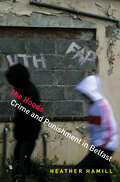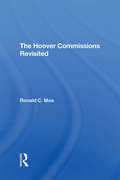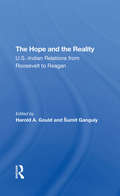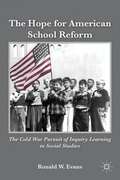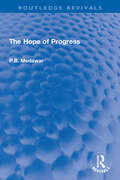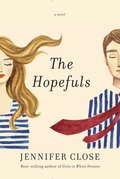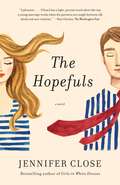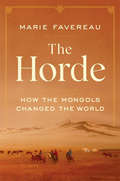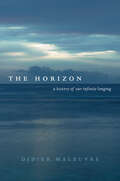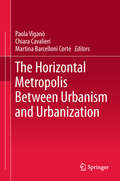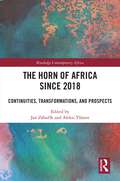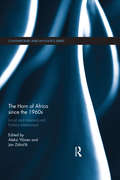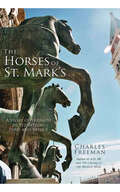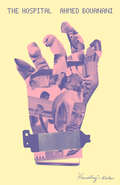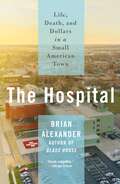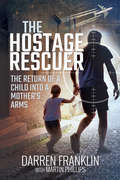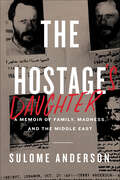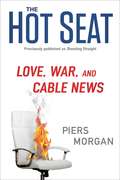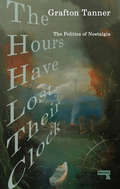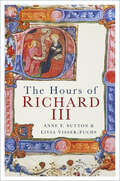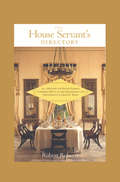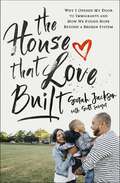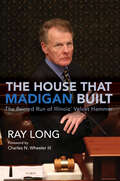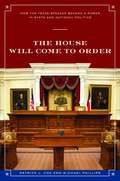- Table View
- List View
The Hoods: Crime and Punishment in Belfast
by Heather HamillA distinctive feature of the conflict in Northern Ireland over the past forty years has been the way Catholic and Protestant paramilitaries have policed their own communities. This has mainly involved the violent punishment of petty criminals involved in joyriding and other types of antisocial behavior. Between 1973 and 2007, more than 5,000 nonmilitary shootings and assaults were attributed to paramilitaries punishing their own people. But despite the risk of severe punishment, young petty offenders--known locally as "hoods"--continue to offend, creating a puzzle for the rational theory of criminal deterrence. Why do hoods behave in ways that invite violent punishment? In The Hoods, Heather Hamill explains why this informal system of policing and punishment developed and endured and why such harsh punishments as beatings, "kneecappings," and exile have not stopped hoods from offending. Drawing on a variety of sources, including interviews with perpetrators and victims of this violence, the book argues that the hoods' risky offending may amount to a game in which hoods gain prestige by displaying hard-to-fake signals of toughness to each other. Violent physical punishment feeds into this signaling game, increasing the hoods' status by proving that they have committed serious offenses and can "manfully" take punishment yet remained undeterred. A rare combination of frontline research and pioneering ideas, The Hoods has important implications for our fundamental understanding of crime and punishment.
The Hoover Commissions Revisited
by Ronald C MoeIn recent years numerous bills have been introduced in Congress to establish a major study effort patterned after the two Hoover Commissions of some thirty years ago. The continuing interest in creating a "new Hoover Commission" has prompted questions about the earlier efforts to restructure national government. What were the Hoover Commissions? Ho
The Hope And The Reality: U.s.-indian Relations From Roosevelt To Reagan
by Sumit Ganguly Harold A GouldThis book charts the relationship between the evolving governments of independent India and concurrent US presidential administrations. It provides an in-depth analysis of the motivations, external constraints and ideological agendas that characterized Indian-US relations.
The Hope for American School Reform
by Ronald W. EvansThe Hope of American School Reform tells the story of the origins of the reform in science and math education. The book is drawn, in part, on new research from previously untapped archival sources. The aim of this work is to contribute to our understanding of a major effort to reform school curricula.
The Hope of Progress (Routledge Revivals)
by P.B. MedawarFirst published in 1972, The Hope of Progress presents collection of essays and lectures dealing with the history of scientific ideas and the impact of science on society. The principle piece in this volume is the author’s 1969 presidential address to the British Association ‘On The Effecting of All Things Possible’, an argument for believing in the ability of science to solve the problems it has itself created, and which too many of us believe insoluble. It contains author’s Romanes Lecture on ‘Science and Literature’ and a well known critique of J.D. Watson’s notorious account of the discovery of the molecular structure of DNA, The Double Helix. Other chapters discuss the possibility of the control and domination by science of the body and mind of Man- though the author concludes in ‘The Genetic Improvement of Man’ : ‘I think that, in the main, for many centuries to come, we shall have to put up with human beings as they are at present constituted’. This book will be useful for scholars and researchers of history of science, philosophy of science, natural science, and philosophy in general.
The Hopefuls
by Jennifer CloseA brilliantly funny novel about ambition and marriage from the best selling author of Girls in White Dresses, The Hopefuls tells the story of a young wife who follows her husband and his political dreams to D.C., a city of idealism, gossip, and complicated friendships among young Washington's aspiring elite. When Beth arrives in Washington, D.C., she hates everything about it: the confusing traffic circles, the ubiquitous Ann Taylor suits, the humidity that descends each summer. At dinner parties, guests compare their security clearance levels. They leave their BlackBerrys on the table. They speak in acronyms. And once they realize Beth doesn't work in politics, they smile blandly and turn away. Soon Beth and her husband, Matt, meet a charismatic White House staffer named Jimmy and his wife, Ashleigh, and the four become inseparable, coordinating brunch, birthdays, and long weekends away. But as Jimmy's star rises higher and higher, their friendship--and Beth's relationship with Matt--is threatened by jealousy, competition and rumors. A glorious send-up of young D.C. and a blazingly honest portrait of a marriage, this is the finest work yet by one of our most beloved writers.From the Hardcover edition.
The Hopefuls: A novel (Vintage Contemporaries Ser.)
by Jennifer CloseA brilliantly funny novel about ambition and marriage from the best-selling author of Girls in White Dresses, The Hopefuls tells the story of a young wife who follows her husband and his political dreams to Washington, D.C., a city of idealism, gossip, and complicated friendships among the young aspiring elite. When Beth arrives in D.C., she hates everything about it: the confusing traffic circles, the ubiquitous Ann Taylor suits, the humidity that descends each summer. At dinner parties, guests compare their security clearance levels. They leave their BlackBerrys on the table. They speak in acronyms. And once they realize Beth doesn't work in politics, they smile blandly and turn away. Soon Beth and her husband, Matt, meet a charismatic White House staffer named Jimmy, and his wife, Ashleigh, and the four become inseparable, coordinating brunches, birthdays, and long weekends away. But as Jimmy's star rises higher and higher, the couples' friendship--and Beth's relationship with Matt--is threatened by jealousy, competition, and rumors. A glorious send-up of young D.C. and a blazingly honest portrait of a marriage, this is the finest work yet by one of our most beloved writers.From the Hardcover edition.
The Horde: How the Mongols Changed the World
by Marie FavereauAn epic history of the Mongols as we have never seen them—not just conquerors but also city builders, diplomats, and supple economic thinkers who constructed one of the most influential empires in history. The Mongols are widely known for one thing: conquest. In the first comprehensive history of the Horde, the western portion of the Mongol empire that arose after the death of Chinggis Khan, Marie Favereau shows that the accomplishments of the Mongols extended far beyond war. For three hundred years, the Horde was no less a force in global development than Rome had been. It left behind a profound legacy in Europe, Russia, Central Asia, and the Middle East, palpable to this day. Favereau takes us inside one of the most powerful sources of cross-border integration in world history. The Horde was the central node in the Eurasian commercial boom of the thirteenth and fourteenth centuries and was a conduit for exchanges across thousands of miles. Its unique political regime—a complex power-sharing arrangement among the khan and the nobility—rewarded skillful administrators and diplomats and fostered an economic order that was mobile, organized, and innovative. From its capital at Sarai on the lower Volga River, the Horde provided a governance model for Russia, influenced social practice and state structure across Islamic cultures, disseminated sophisticated theories about the natural world, and introduced novel ideas of religious tolerance. The Horde is the eloquent, ambitious, and definitive portrait of an empire little understood and too readily dismissed. Challenging conceptions of nomads as peripheral to history, Favereau makes clear that we live in a world inherited from the Mongol moment.
The Horizon: A History of Our Infinite Longing
by Didier MaleuvreWhat is a horizon? A line where land meets sky? The end of the world or the beginning of perception? In this brilliant, engaging, and stimulating history, Didier Maleuvre journeys to the outer reaches of human experience and explores philosophy, religion, and art to understand our struggle and fascination with limits—of life, knowledge, existence, and death. Maleuvre sweeps us through a vast cultural landscape, enabling us to experience each stopping place as the cusp of a limitless journey, whether he is discussing the works of Picasso, Gothic architecture, Beethoven, or General Relativity. If, as Aristotle said, philosophy begins in wonder, then this remarkable book shows us how wonder—the urge to know beyond the conceivable—is itself the engine of culture.
The Horizontal Metropolis Between Urbanism and Urbanization
by Paola Viganò Chiara Cavalieri Martina Barcelloni CorteThis book provides an overview of the Horizontal Metropolis concept, and of the theoretical, methodological and political implications for the interdisciplinary field in which it operates. The book investigates the contemporary emergence of a new type of extended urbanity across regions, territories and continents, up to the global scale. Further, it explores the diffusion of contemporary urban conditions in an interdisciplinary and original manner by analyzing essential case studies. Offering extensive content on the Horizontal Metropolis concept, the book presents a range of approaches intended to transcend various inherited spatial ontologies: urban/rural, town/country, city/non-city, and society/nature. The book is intended for all readers interested in the emergence and development of new approaches in cultural theory, urban and design education, landscape urbanism and geography.
The Horn of Africa since 2018: Continuities, Transformations, and Prospects (Routledge Contemporary Africa)
by Aleksi Ylönen Jan ZáhoříkThis book takes stock of developments in the Horn of Africa since 2018, a key time of political turbulence marked by revolution, military coups, and civil war as well as alliances, peace deals, reforms, and reconciliation processes.Bringing together a group of experienced and younger scholars from the Horn of Africa and Europe, the book investigates the various multi-layered and intertwined factors and consequences of political developments in Ethiopia, Eritrea, Sudan, South Sudan, Djibouti, and Somalia. The authors investigate the endemic political instability across much of the Horn of Africa, while also reflecting on political continuities and transformations, including attempts at peace- and state-building. They consider the important role of regional organizations and intra- and extra-regional actors in the domestic politics of the states in the Horn of Africa. The book concludes with a section focusing on the prospects for reform and conflict resolution in the context of shifting regional power relations.This book will be an important resource for researchers working on contemporary politics, history, and society in the Horn of Africa.
The Horn of Africa since the 1960s: Local and International Politics Intertwined (Contemporary African Politics)
by Aleksi Ylönen Jan Záho 345 ÍkThe Horn of Africa has long been one of the most dynamic and politically turbulent sub-regions on the African continent. Host to great ancient civilizations, diverse peoples, and expansive states, the region has experienced massive social, economic, and political transformations which have given rise to military coups, revolutions and intractable ethnic, socio-economic, and religious conflicts. This comprehensive volume brings together a team of expert scholars who analyze international, regional, national, and local affairs in the Horn of Africa. The chapters demonstrate the intertwined nature of the actors and forces shaping political realities. The case studies, focusing on Ethiopia, Eritrea, Somalia, Somaliland, Sudan, and South Sudan eloquently illustrate the complex dynamics connecting the spectrum of political issues in the region. The Horn of Africa since the 1960s will be of interest to students and scholars of contemporary Africa and political science.
The Horses of St. Mark's: A Story of Triumph in Byzantium, Paris, and Venice
by Charles FreemanThe noted historian explores the mysterious origins and surprising adventures of four iconic bronze statues as they appear and reappear through the ages.In July 1798, a triumphant procession made its way through the streets of Paris. Echoing the parades of Roman emperors many years before, Napoleon Bonaparte was proudly displaying the spoils of his recent military adventures. There were animals—caged lions and dromedaries—as well as tropical plants. Among the works of art on show, one stood out: four horses of gilded metal, taken by Napoleon from their home in Venice.The Horses of St Mark's have found themselves at the heart of European history time and time again: in Constantinople, at both its founding and sacking in the Fourth Crusade; in Venice, at both the height of its greatness and fall in 1797; in the Paris of Napoleon, and the revolutions of 1848; and back in Venice, the most romantic city in the world. Charles Freeman offers a fascinating account of both the statues themselves and the societies through which they have travelled and been displayed. As European society has developed from antiquity to the present day, these four horses have stood and watched impassively. This is the story of their—and our—times.
The Hospital
by Lara Vergnaud Anna Della Subin Ahmed BouananiA tour de force: an utterly singular modern Moroccan classic “When I walked through the large iron gate of the hospital, I must have still been alive…” So begins Ahmed Bouanani’s arresting, hallucinatory 1989 novel The Hospital, appearing for the first time in English translation. Based on Bouanani’s own experiences as a tuberculosis patient, the hospital begins to feel increasingly like a prison or a strange nightmare: the living resemble the dead; bureaucratic angels of death descend to direct traffic, claiming the lives of a motley cast of inmates one by one; childhood memories and fantasies of resurrection flash in and out of the narrator’s consciousness as the hospital transforms before his eyes into an eerie, metaphorical space. Somewhere along the way, the hospital’s iron gate disappears. Like Sadegh Hedayat’s The Blind Owl, the works of Franz Kafka—or perhaps like Mann’s The Magic Mountain thrown into a meat-grinder—The Hospital is a nosedive into the realms of the imagination, in which a journey to nowhere in particular leads to the most shocking places.
The Hospital: Life, Death, and Dollars in a Small American Town
by Brian AlexanderUSA Today's 5 BOOKS NOT TO MISS | The Washington Post's 10 BOOKS TO READ IN MARCH | Fortune's 11 BOOKS TO READ IN MARCH"Takes readers into the world of the American medical industry in a way no book has done before....details how we’ve created the dilemma we’re in." —Fortune"With his signature gut-punching prose, Alexander breaks our hearts as he opens our eyes to America’s deep-rooted sickness and despair by immersing us in the lives of a small town hospital and the people it serves." —Beth Macy, bestselling author of Dopesick An intimate, heart wrenching portrait of one small hospital that reveals the magnitude of America’s health care crises.By following the struggle for survival of one small-town hospital, and the patients who walk, or are carried, through its doors, The Hospital takes readers into the world of the American medical industry in a way no book has done before. Americans are dying sooner, and living in poorer health. Alexander argues that no plan will solve America’s health crisis until the deeper causes of that crisis are addressed. Bryan, Ohio's hospital, is losing money, making it vulnerable to big health systems seeking domination and Phil Ennen, CEO, has been fighting to preserve its independence. Meanwhile, Bryan, a town of 8,500 people in Ohio’s northwest corner, is still trying to recover from the Great Recession. As local leaders struggle to address the town’s problems, and the hospital fights for its life amid a rapidly consolidating medical and hospital industry, a 39-year-old diabetic literally fights for his limbs, and a 55-year-old contractor lies dying in the emergency room. With these and other stories, Alexander strips away the wonkiness of policy to reveal Americans’ struggle for health against a powerful system that’s stacked against them, but yet so fragile it blows apart when the pandemic hits. Culminating with COVID-19, this book offers a blueprint for how we created the crisis we're in.
The Hostage Rescuer: The Return of a Child into a Mother's Arms
by Martin Phillips Darren FranklinThe gripping true crime story of a child abducted by his father from his mother, and the international race to rescue him against dangerous odds.Two close encounters with death convince Darren Franklin that his career in global private security is not the healthiest. Meanwhile Scottish nurse Diane is on a life-changing journey of her own after a Shirley Valentine-style romance on a Greek holiday island. As she moves to Australia to marry her Greek lover and start a family, Darren escapes a contract on his life and teams up with a former British special forces operative to get into the business of rescuing abducted children. Then Darren’s and Diane’s paths cross. After Diane’s marriage breaks down, her ex takes their four-year-old son Theo back to the Greek islands, and, when all attempts to get her son back via the courts have failed, Darren’s company is called in to get him back. As Diane waits anxiously in the wings, Darren and his small team must contend with hostile locals, double-crossing police, and dubious legal contacts to conduct surveillance on their target, formulate a plan, and grab the boy before making their hazardous escape. They can trust no one. A whole island community is against them, they have their suspicions about their own lawyer, and the charity go-between on their team is actively leaking details of their plans, risking their mission, and possibly their lives. Set against an epidemic of parental abductions, and a background of frequent failed recoveries, the action swings from Britain to South America to Australia, to the USA and the Greek Islands on a dramatic, emotional roller coaster from start to finish.
The Hostage Rescuer: The Return of a Child into a Mother's Arms
by Martin Phillips Darren FranklinThe gripping true crime story of a child abducted by his father from his mother, and the international race to rescue him against dangerous odds.Two close encounters with death convince Darren Franklin that his career in global private security is not the healthiest. Meanwhile Scottish nurse Diane is on a life-changing journey of her own after a Shirley Valentine-style romance on a Greek holiday island. As she moves to Australia to marry her Greek lover and start a family, Darren escapes a contract on his life and teams up with a former British special forces operative to get into the business of rescuing abducted children. Then Darren’s and Diane’s paths cross. After Diane’s marriage breaks down, her ex takes their four-year-old son Theo back to the Greek islands, and, when all attempts to get her son back via the courts have failed, Darren’s company is called in to get him back. As Diane waits anxiously in the wings, Darren and his small team must contend with hostile locals, double-crossing police, and dubious legal contacts to conduct surveillance on their target, formulate a plan, and grab the boy before making their hazardous escape. They can trust no one. A whole island community is against them, they have their suspicions about their own lawyer, and the charity go-between on their team is actively leaking details of their plans, risking their mission, and possibly their lives. Set against an epidemic of parental abductions, and a background of frequent failed recoveries, the action swings from Britain to South America to Australia, to the USA and the Greek Islands on a dramatic, emotional roller coaster from start to finish.
The Hostage's Daughter: A Story of Family, Madness, and the Middle East
by Sulome AndersonIn this gripping blend of reportage, memoir, and analysis, a journalist and daughter of one of the world’s most famous hostages, Terry Anderson, takes an intimate look at her father’s captivity during the Lebanese Hostage Crisis and the ensuing political firestorm on both her family and the United States—as well as the far-reaching implications of those events on Middle Eastern politics today.In 1991, seven-year-old Sulome Anderson met her father, Terry, for the first time. While working as the Middle East bureau chief for the Associated Press covering the long and bloody civil war in Lebanon, Terry had been kidnapped in Beirut and held for more than six years by a Shiite Muslim militia associated by most with the Hezbollah movement.As the nation celebrated, the media captured a smiling Anderson family joyously reunited. But the truth was far darker. Plagued by PTSD, Terry was a moody, aloof, and distant figure to the young daughter who had long dreamed of his return—and while she smiled for the cameras all the same, she absorbed his trauma as her own. Years later, after long battles with drug abuse and mental illness, Sulome would travel to the Middle East as a reporter, seeking to understand her father, the men who had kidnapped him, and ultimately, herself. What she discovered was shocking—not just about Terry, but about the international political machinations that occurred during the years of his captivity.The Hostage’s Daughter is an intimate look at the effect of the Lebanese Hostage Crisis on Anderson’s family, the United States, and the Middle East today. Sulome tells moving stories from her experiences as a reporter in the region and challenges our understanding of global politics, the forces that spawn terrorism and especially Lebanon, the beautiful, devastated, and vitally important country she came to love. Powerful and eye-opening The Hostage’s Daughter is essential reading for anyone interested in international relations, this violent, haunted region, and America's role in its fate.
The Hot Seat: Love, War, and Cable News
by Piers MorganFrom ultimate media insider Piers Morgan, an adrenaline-fueled account of life at CNN, exclusive stories about his celebrity encounters, and details about his high-profile decision to take on the issue of gun control at its historical tipping point.When Piers Morgan arrived in the US, he was a thoughtful outsider and observer of our country--a modern-day Alexis de Tocqueville, if a limousine-chasing British tabloid editor could be called that. From rushing to the roof of the studio that filmed America's Got Talent so that he could broadcast live breaking news about the tsunami in Japan, only to rush back and judge a singing, dancing Christmas tree; from being snubbed by Bill O'Reilly, who pretended not to recognize him (despite the largest cable news marketing campaign in television history) to, moments later, consenting to take a picture with O'Reilly's daughter, who happened to be a big fan of America's Got Talent (Bill was immediately scolded by security for "photographing the talent," which is a comeuppance more artful than one could make up); from declaring in no uncertain terms that the 2011 shooting of Gabby Giffords would change American guns laws as surely as the 1996 massacres in Dunblain, Scotland, and Tasmania, Australia, had done, only to rail in disbelief the following year at the Newtown, Connecticut, massacre in 2012, and the gun lobby's insistence that it was "too soon" to discuss the problem of guns in America.The hit HBO series Newsroom posits that America needs a newsman who has a point of view, who does not suffer fools, and who does not give "equal time" to idiocy. Watching Piers Morgan, one gets the sense that he is as close to the character Will McAvoy as we have in this country presently. A scrappier version of Anderson Cooper. A thinking man's bruiser.Piers gives an adrenaline-fueled account of life at CNN and a reflective and heartfelt account of his continuing love affair with America, including his high profile participation in the gun debate. He is also happy to weave personal material on his wife and family, so you have a sense of really knowing the man.
The Hours Have Lost Their Clock: The Politics of Nostalgia
by Grafton TannerThe Hours Have Lost Their Clock charts the rise of nostalgia in an era knocked out of time.In The Hours Have Lost Their Clock, Grafton Tanner charts the rise of nostalgia in an era knocked out of time. Nostalgia is the defining emotion of our age. Political leaders promise a return to yesteryear. Old movies are remade and cancelled series are rebooted. Veterans reenact past wars, while the displaced across the world long for home. But who is behind this collective ache for a home in the past? Do we need to eliminate nostalgia, or just cultivate it better? And what is at stake if we make the wrong choice? Moving from the fight over Confederate monuments to the birth of homeland security to the mourning of species extinction, Grafton Tanner traces nostalgia&’s ascent in the twenty-first century, revealing its power as both a consequence of our unstable time and a defense against it. With little faith in a future of climate change and economic anxiety, many have turned to nostalgia to weather the present, while powerful elites exploit it for their own gain. An exploration into the politics of loss and yearning, The Hours Have Lost Their Clock is an urgent call to take nostalgia seriously. The very future depends on it.
The Hours of Richard III
by Anne F. Sutton Livia Visser-FuchsAs a person’s religious convictions, especially in times past, can be considered fundamental to their character and behaviour, the nature of King Richard III’s piety has been the subject of considerable debate. Much of this controversy has focused on the Book of Hours adopted by the king for his own private use following his coronation, and to which certain prayers, including that known as the ‘Prayer of Richard III’, were added.In The Hours of Richard III Ricardian experts Anne F. Sutton and Livia Visser-Fuchs explore the manuscript and the prayer’s text. The manuscript (now preserved in Lambeth Palace Library) was originally produced in London around 1420 and the text shows the preoccupations of a devout man of the fifteenth century, while its decoration showcases the development of London manuscript illumination during that period. Moreover, in this analysis of the manuscript, the authors offer an insight into the personality of Richard III, one of the most controversial figures in medieval history.
The House Servant's Directory: A Monitor For Private Families (American Antiquarian Cookbook Collection)
by Graham Russell Hodges Robert RobertsRobert Roberts' The House Servant's Directory, first published in 1827 and the standard for household management for decades afterward, is remarkable for several reasons: It is one of the first books written by an African American and issued by a commercial press, and it was written while Roberts (ca. 1780-1860) was in the employ of Christopher Gore (1758-1827), a former senator from and governor of Massachusetts (and ancestor of the novelist Gore Vidal). Gore Place, where Roberts worked from 1825 to 1827, is one of the grandest neoclassical mansions built in America. Not only was the extraordinary set of recommendations that Roberts made about relations between servants and their masters unique for its time, but his many recipes for cleaning furniture and clothing and for purchasing, preparing, and serving food and drink for small and large dinners are also still useful today. As portrayed in Graham Hodges' introduction, Roberts' own story is a unique window into the work habits and thoughts of America's domestic workers and into antebellum African American politics. Of particular note is Roberts' contribution to the emergence of new self-perceptions of black manliness. Written at a time when male Americans in general were reconsidering the construction of masculinity, Roberts' advice to his fellow servants fostered black dignity for work that few felt merited respect, and his counsel to employers on proper treatment of their servants insisted on their humanity and respect for their skills.
The House That Love Built: Why I Opened My Door to Immigrants and How We Found Hope beyond a Broken System
by Sarah Jackson"Jackson's visionary account is a beautiful model of sacrificial love." -- Publishers Weekly Starred ReviewThe House that Love Built is the quintessential story of one woman's questioning what it means to be an American--and a Christian--in light of a broken immigration system. Through tender stories of opening her heart and home to immigrants, Sarah Jackson shines a holy light on loving our neighbor.Sarah Jackson once thought immigration justice was administered through higher walls and longer fences. Then she met an immigrant--a deported young father separated from his US-citizen family--and everything changed. As Sarah began to know fractured families ravaged by threats in their homeland and further traumatized in US detention, biblical justice took on a new meaning.As Sarah opened her heart--and her home--to immigrants, she experienced a surprising transformation and the gift of extraordinary community. The work she began through the ministry of Casa de Paz joined the centuries-old Christian tradition of hospitality, shining a holy light on what it means to love our neighbor.The dilemma of undocumented people continues to hover over America, and it raises urgent questions for every Christian:What is our responsibility to the "stranger" in our midst?What does God's kingdom look like in the global-political reality of immigration?What difference can one person make?Sarah engages these questions through profound and tender stories, placing readers in the shoes of individuals on every side of the issue--asylum seekers torn from their families, the guards who oversee them, ordinary people with lapsed visas, the families left to survive on their own, the unheralded advocates for immigrants' rights, and the government officials who decide the fates of others.Ultimately, Sarah's journey illuminates how hope can be restored through simple yet radical acts of love.
The House That Madigan Built: The Record Run of Illinois' Velvet Hammer
by Ray LongMichael Madigan rose from the Chicago machine to hold unprecedented power as Speaker of the Illinois House of Representatives. In his thirty-six years wielding the gavel, Madigan outlasted governors, passed or blocked legislation at will, and outmaneuvered virtually every attempt to limit his reach. Veteran reporter Ray Long draws on four decades of observing state government to provide the definitive political analysis of Michael Madigan. Secretive, intimidating, shrewd, power-hungry--Madigan mesmerized his admirers and often left his opponents too beaten down to oppose him. Long vividly recreates the battles that defined the Madigan era, from stunning James Thompson with a lightning-strike tax increase, to pressing for a pension overhaul that ultimately failed in the courts, to steering the House toward the Rod Blagojevich impeachment. Long also shines a light on the machinery that kept the Speaker in power. Head of a patronage army, Madigan ruthlessly used his influence and fundraising prowess to reward loyalists and aid his daughter’s electoral fortunes. At the same time, he reshaped bills to guarantee he and his Democratic troops shared in the partisan spoils of his legislative victories. Yet Madigan’s position as the state’s seemingly invulnerable power broker could not survive scandals among his close associates and the widespread belief that his time as Speaker had finally reached its end. Unsparing and authoritative, The House That Madigan Built is the page-turning account of one the most powerful politicians in Illinois history.
The House Will Come to Order
by Michael Phillips Patrick L. CoxIn a state assumed to have a constitutionally weak governor, the Speaker of the Texas House wields enormous power, with the ability to almost single-handedly dictate the legislative agenda. The House Will Come to Order charts the evolution of the Speaker’s role from a relatively obscure office to one of the most powerful in the state. This fascinating account, drawn from the Briscoe Center’s oral history project on the former Speakers, is the story of transition, modernization, and power struggles. Weaving a compelling story of scandal, service, and opportunity, Patrick Cox and Michael Phillips describe the divisions within the traditional Democratic Party, the ascendance of Republicans, and how Texas business, agriculture, and media shaped perceptions of officeholders. While the governor and lieutenant governor wielded their power, the authors show how the modern Texas House Speaker built an office of equal power as the state became more complex and diverse. The authors also explore how race, class, and gender affected this transition as they explain the importance of the office in Texas and the impact the state’s Speakers have had on national politics. At the apex of its power, the Texas House Speaker’s role at last receives the critical consideration it deserves.
